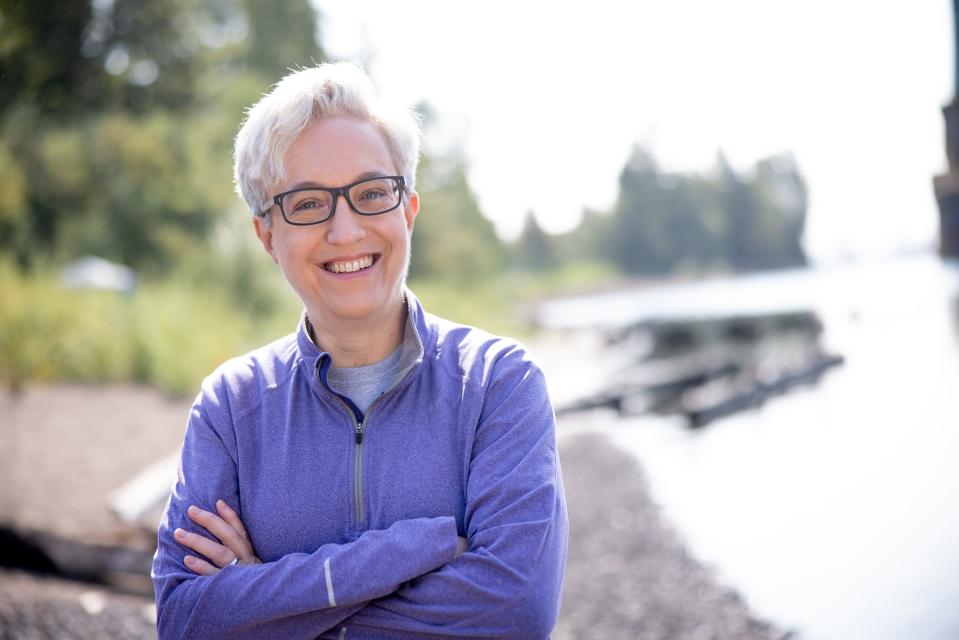Supreme Court: Nick Kristof cannot run for Oregon governor in 2022

- Oops!Something went wrong.Please try again later.
- Oops!Something went wrong.Please try again later.
The Oregon Secretary of State appropriately determined former New York Times columnist Nick Kristof did not meet the Oregon Constitution's three-year residency requirement to run for Oregon governor, the state Supreme Court ruled Thursday.
"We recognize that (Kristof) has longstanding ties to Oregon, that he owns substantial property and operates a farm here," the opinion read. "But that is not the issue here. The issue, instead, is whether (he) has been, during the three years preceding the November 2022 election, 'a resident within this State.'''
The Secretary of State's Office decided in early January that Kristof was a resident of New York until late 2020 or early 2021, based on a record that he: received mail at his New York address, filed income taxes in New York, spent most of his time in New York and, as recently as November 2020, voted in New York.
Kristof had petitioned the Supreme Court to compel Secretary of State Shemia Fagan to accept his declaration of candidacy for governor, saying not only was the term "resident" being defined too narrowly, but even under that definition he was a resident of Oregon.
Subscription sale: Only $1 per month for 6 months. Subscribe today!
Prior decision: Oregon Secretary of State rejects Nicholas Kristof's filing for governor
In a statement, Kristof accepted the Supreme Court's ruling and said he would not petition the court for reconsideration or seek clarity of unaddressed issues in federal court.
"The Supreme Court has spoken. And while we are disappointed in the decision, we respect its ruling and thank the justices for their thoughtful consideration on this matter," Kristof said. "This ruling represents the end of my campaign for governor. But let me be clear: I’m not going anywhere."
Kristof said he would "keep fighting" to improve the state as the problems that led to him running for governor still exist. He did not say if he would seek public office, either during this election cycle or in future ones.
Kristof's camp had argued the two-time Pulitzer Prize winner has always considered Oregon his permanent home, even when he was living internationally or in New York. As evidence, they noted that Kristof has long maintained a home in Yamhill and supplied writings where Kristof described Oregon as his home.
Those emotional ties to Oregon, they said, should be an important aspect of determining a candidate's residency.
In their unanimous ruling, the justices wrote it was not the court's role — nor the secretary of state's — to determine if Kristof was sufficiently "Oregonian." Instead, the court was tasked with defining the term "resident of this state" as used in the Oregon Constitution and deciding whether elections officials had followed the appropriate legal standard in their decision.
The Court determined Fagan appropriately defined "resident" as being related to one's "domicile" — where a person intends to live indefinitely. A person can only have one domicile.
The Court acknowledged Kristof did begin to spend more time in Oregon starting in 2018 and 2019, during which time he began leasing and bearing more responsibility for operating his family's farm, which could be evidence supporting his residency argument.
However, the opinion also noted — as Fagan did — during this time Kristof was still a resident of New York, maintained a New York driver's license and was registered to vote in New York.
Based on the record of evidence, the Court found Fagan was "not compelled" to confirm Kristof as a resident of Oregon for three years prior to November 2022.
"Given the objective evidence in the record of relator’s continued presence in and related connections to New York in 2019 and 2020, and the limited detail on key components of his ongoing connections to Oregon, the secretary was not compelled to find that, as of November 2019, relator had reestablished his residence in Oregon," the opinion read.
In a news conference Thursday, Fagan thanked the court for reaching a swift decision and affirming the standard Oregon elections officials use to determine the eligibility of a person to seek elected office.
"As Oregon’s chief elections officer, I have a responsibility to apply the rules fairly," Fagan said. "It doesn’t matter what political party you belong to, doesn't matter if you’re a well-funded front-runner or if you're a political novice. Everyone will be treated fairly by the Oregon Elections Division."
Fagan also cautioned those who disagree with the rulings against accusing non-partisan elections officials of making decisions based on corruption, bias or political motivation.
"Increasing harassment and attacks on elections workers here in Oregon and around the county often begin with empty allegations of bias or corruption," Fagan said.
Fagan identified Kristof himself as making one such accusation in the immediate aftermath of the Elections Division's January decision. However, she said she was not aware of any threats or harassment towards elections officials that stemmed from this case.
Kristof said on Jan. 6 that elections officials were denying his candidacy because they felt threatened by "my willingness to challenge the status quo" and said "a failing political establishment in Oregon has chosen to protect itself, rather than give voters a choice."
Kristof had made himself one of the top contenders in a crowded Democratic gubernatorial primary, in large part due to his fundraising success.
As of Feb. 17, Kristof reported more than $1.6 million in his campaign account, with large contributions from the Oregon Labor Policy Network and many individuals residing outside of Oregon, including Bill and Melinda Gates.
His agenda focused on helping Oregonians who "had been left behind," whether it be those struggling with homelessness, access to mental health care, low-paying jobs, inadequate educational opportunities or climate change impacts.
He also touted his outsider status, saying that electing another governor from within the state's political class would not solve the major problems the state faces.
Leaving office: Tina Kotek discusses her tenure as Oregon House speaker
Kristof now must determine what he wants to do with his well-funded political action committee. Elections officials said his options include: changing the purpose of the committee (including running for a different office this year); contributing money to other campaigns; and issuing refunds.
He can also keep his committee open in its current form indefinitely while he decides what he wants to do within Oregon politics.
Still in contention in the Democratic primary is former House Speaker Tina Kotek, who has about $930,000 in her campaign account. She has recently racked up a number of high-profile endorsements, including from SEIU (the state's largest labor union), Planned Parenthood PAC of Oregon and Pro-Choice Oregon PAC.
"Nick Kristof has long written about pressing issues facing Oregonians and his voice will continue to be important as we tackle Oregon's biggest issues," Kotek said in a statement Thursday. "I look forward to working with him as a fellow Democrat."

State Treasurer Tobias Read is the other Democrat state political analysts consider a serious contender. He has about $615,000 in his campaign account.
In a statement Thursday, the Read campaign noted that while Kristof won't be on the ballot "he helped shape the Democratic primary conversation, drawing attention to policies that are failing too many Oregonians."
On the Republican side, former House Republican Leader Christine Drazan, Salem oncologist and former gubernatorial candidate Bud Pierce and Sandy mayor Stan Pulliam are leading the pack. Their campaigns currently have on hand about $1 million, $160,000 and $330,000, respectively.
In total, 31 candidates have registered with the Secretary of State's Office to vie for the Republican or Democratic nomination for governor.
Former Sen. Betsy Johnson has also announced her intention to run in the general election as an unaffiliated candidate and has more than $3.7 million in her campaign account. She will not need to run in a primary election, but will need to gather nearly 25,000 valid signatures from Oregon voters to make it onto the November ballot.
Reporter Connor Radnovich covers the Oregon Legislature and state government. Contact him at cradnovich@statesmanjournal.com or 503-399-6864, or follow him on Twitter at @CDRadnovich.
This article originally appeared on Salem Statesman Journal: Supreme Court: Nick Kristof cannot run for Oregon governor in 2022

